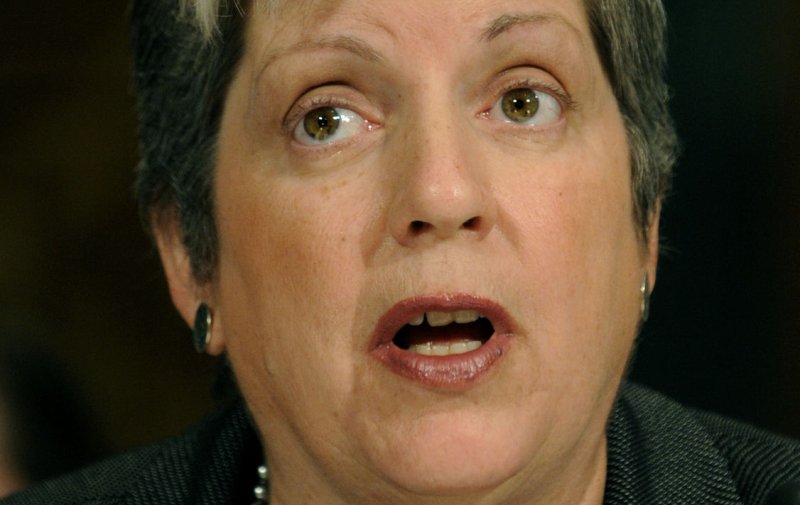The U.S. Department of Homeland Security is changing how it approaches the security-trade relationship as it moves into 2012, Secretary Janet Napolitano said. Oct. 19 file photo. UPI/Roger L. Wollenberg |
License Photo
WASHINGTON, Jan. 30 (UPI) -- The U.S. Department of Homeland Security is changing how it approaches the security-trade relationship as it moves into 2012, Secretary Janet Napolitano said.
"This transition will be a key, on-going focus for the department in 2012 as we continue our drive toward a risk-based, information-driven approach to security, where what we know about a piece of cargo or a passenger allows us to better assess its risk and identify threats at the earliest point possible," Napolitano said Monday in Washington during her second annual address on the state of homeland security.
Recognizing that "security and efficiency are not mutually exclusive," Napolitano said the country can enhance security while reducing wait times, which will expedite travel and keep costs down.
One way security is strengthened while travel and trade are expedited is through the department's trusted traveler and trusted shipper programs.
"These programs rely on mutually agreed-upon information sharing," she said, "which allows us to know more about a traveler or piece of cargo before it begins its journey."
The programs also offer an economic benefit to all involved by speeding up the movement of goods and people critical to business.
She specifically praised two programs and said the administration plans to expand in 2012 -- Global Entry, an international program, and TSA PreCheck, a domestic one.
The programs offer "expedited screening for travelers who volunteer information about themselves prior to flying," Napolitano said. In exchange for the information, travelers can expect expedited screenings that may not include removing their shoes, laptops, jackets or belts.
The strategy is to reduce the size of a search.
"If we have to look for a needle in a haystack, it makes sense to use all of the information we have about the pieces of hay to make the haystack smaller," she said.
Napolitano said the two strategies are different from profiling because profiling is "not necessarily intelligence driven."
"For example, we may have information that leads us to believe that certain travel routes are problematic. We can see that from a person's travel history," she said. "We may have information that we're looking for, not for all people from a particular country, but for a person who has traveled here, here and here, and from a particular age group."
As the department advances toward a risk-based strategy, Napolitano said Homeland Security will try to strike the right balance between efficiency and security and to prevent terrorists from trying to game the pre-screening process.
"And what's critical is that both of these initiatives strengthen security while expediting travel for those travelers we know the most about," she said.
Napolitano also urged Congress to take up immigration reform.
"The bottom line is that our nation's current immigration laws are sorely outdated and in need of revision," she said. "President Obama views such a revision as both a matter of fairness and as an economic necessity. ... [We] have acted on clear and common sense priorities when it comes to immigration enforcement under the existing laws."
While the department has come a long way since its founding in the aftermath of the Sept. 11, 2001, terrorist attacks on the United States, "we remain aware of how a successful terrorist attack or natural disaster can inflict economic damage beyond its human toll," the secretary said.
"Threats against our nation, whether by terrorism or otherwise, continue to exist and evolve," Napolitano said. And [the Department of Homeland Security] must continue to evolve as well."















